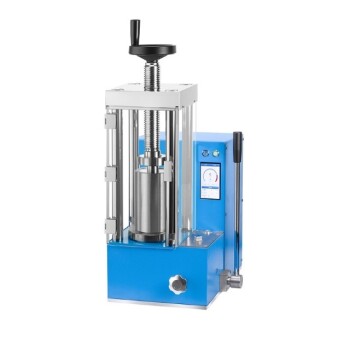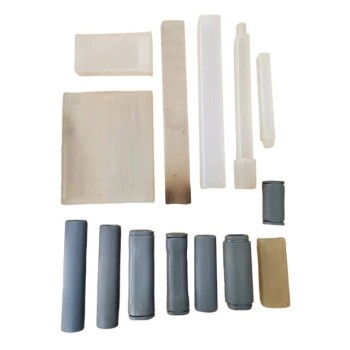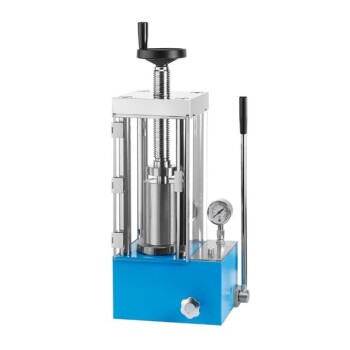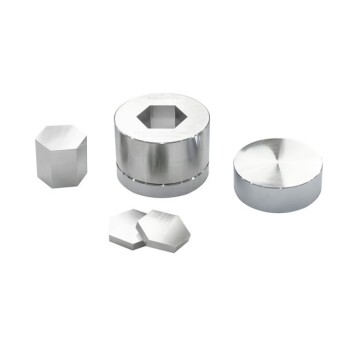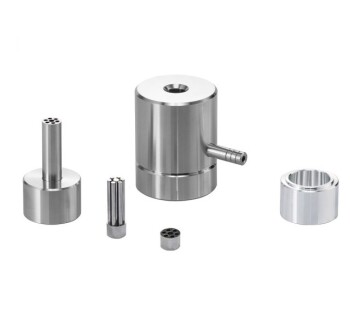At its core, Cold Isostatic Pressing (CIP) is a foundational technology in industries that require high-performance components made from advanced powders. Its application is widespread, most notably in the aerospace, automotive, electronics, and medical fields. These sectors rely on CIP to create parts with uniform density and complex shapes that are impossible to achieve with other consolidation methods.
The true value of CIP isn't just the parts it creates, but the predictable uniformity it imparts. By applying equal pressure from all directions, it eliminates internal voids in powdered materials, forming a dense, consistent "green" component that shrinks reliably during final sintering.
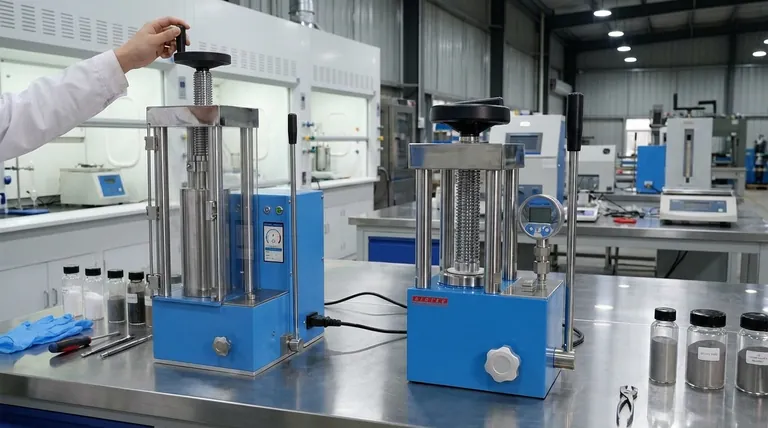
Why Demanding Industries Rely on CIP
CIP solves a critical manufacturing problem: how to form a solid, uniform object from a loose powder before it's subjected to final heat treatment. This initial consolidation step is crucial for the performance and reliability of the end product.
Aerospace and Defense
In aerospace, component failure is not an option. CIP is used to manufacture parts from advanced ceramics, composites, and metal powders that must withstand extreme temperatures and pressures.
The uniform density achieved through CIP is critical for producing lightweight, high-strength components with no hidden weak points. This directly enhances aircraft safety and reduces failure rates in mission-critical systems.
Automotive
The automotive industry uses CIP to produce durable engine components that require high density and wear resistance.
By consolidating metal powders before final shaping and sintering, manufacturers can create parts like valve seats and high-performance pistons that can endure the harsh environment inside an internal combustion engine.
Healthcare and Medical
For medical implants, material integrity and biocompatibility are paramount. CIP is the preferred method for forming ceramic or metal-based implants like hip and knee replacements.
The process ensures a completely uniform structure, free of internal stresses or voids that could become failure points over the product's life. This reliability is essential for parts placed inside the human body.
Electronics and Energy Storage
Modern electronics and next-generation energy solutions depend on advanced materials with specific properties. CIP is used to form components like electrical insulators, isotropic graphite, and parts for telecommunications.
Its role is especially crucial in emerging technologies like solid-state batteries, where CIP helps create dense, stable ceramic electrolytes—a key component for improved safety and performance.
Understanding the Trade-offs
While powerful, CIP is a specialized process with specific constraints. Understanding its role in the larger manufacturing workflow is key.
It Creates a 'Green' Body
A component just after CIP is known as a "green" body. It has the consistency and fragility of a piece of chalk.
This green part is not the final product. It is an intermediate step, and the part only gains its final strength and properties after undergoing a secondary high-temperature process like sintering or Hot Isostatic Pressing (HIP).
Not a Standalone Process
CIP must be viewed as one step in a multi-stage process (powder -> CIP -> sintering/HIP). It does not produce a finished part on its own.
This means that facilities using CIP must also have the furnace technology and expertise required for the subsequent densification steps. The overall cost and production time reflect this entire workflow.
Is CIP the Right Process for Your Application?
Choosing a manufacturing process depends entirely on your material and performance requirements.
- If your primary focus is extreme performance and reliability: CIP is the superior choice for consolidating advanced ceramic or metal powders where uniform density is critical to prevent failure.
- If your primary focus is creating complex shapes from powder: CIP excels at forming intricate geometries that are difficult or impossible to make with traditional uniaxial pressing, ensuring consistent density throughout the part.
- If your primary focus is simple, high-volume parts: For less complex geometries, conventional die compaction may be a more cost-effective method, as CIP's primary advantage lies in uniformity for demanding applications.
Ultimately, Cold Isostatic Pressing is the essential bridge between advanced powdered materials and the reliable, high-performance components that define modern engineering.
Summary Table:
| Industry | Key Applications | Benefits |
|---|---|---|
| Aerospace | Ceramics, composites, metal parts | Uniform density, lightweight, high-strength |
| Automotive | Engine components (e.g., pistons) | Durability, wear resistance |
| Medical | Implants (e.g., hip replacements) | Biocompatibility, reliability |
| Electronics | Insulators, battery components | Stability, performance in energy storage |
Ready to enhance your lab's capabilities with reliable Cold Isostatic Pressing solutions? KINTEK specializes in lab press machines, including automatic lab presses, isostatic presses, and heated lab presses, tailored for industries like aerospace, automotive, medical, and electronics. Our equipment ensures uniform density and high-performance parts, helping you achieve precise results and reduce failure rates. Contact us today to discuss how we can support your laboratory needs and boost your manufacturing efficiency!
Visual Guide
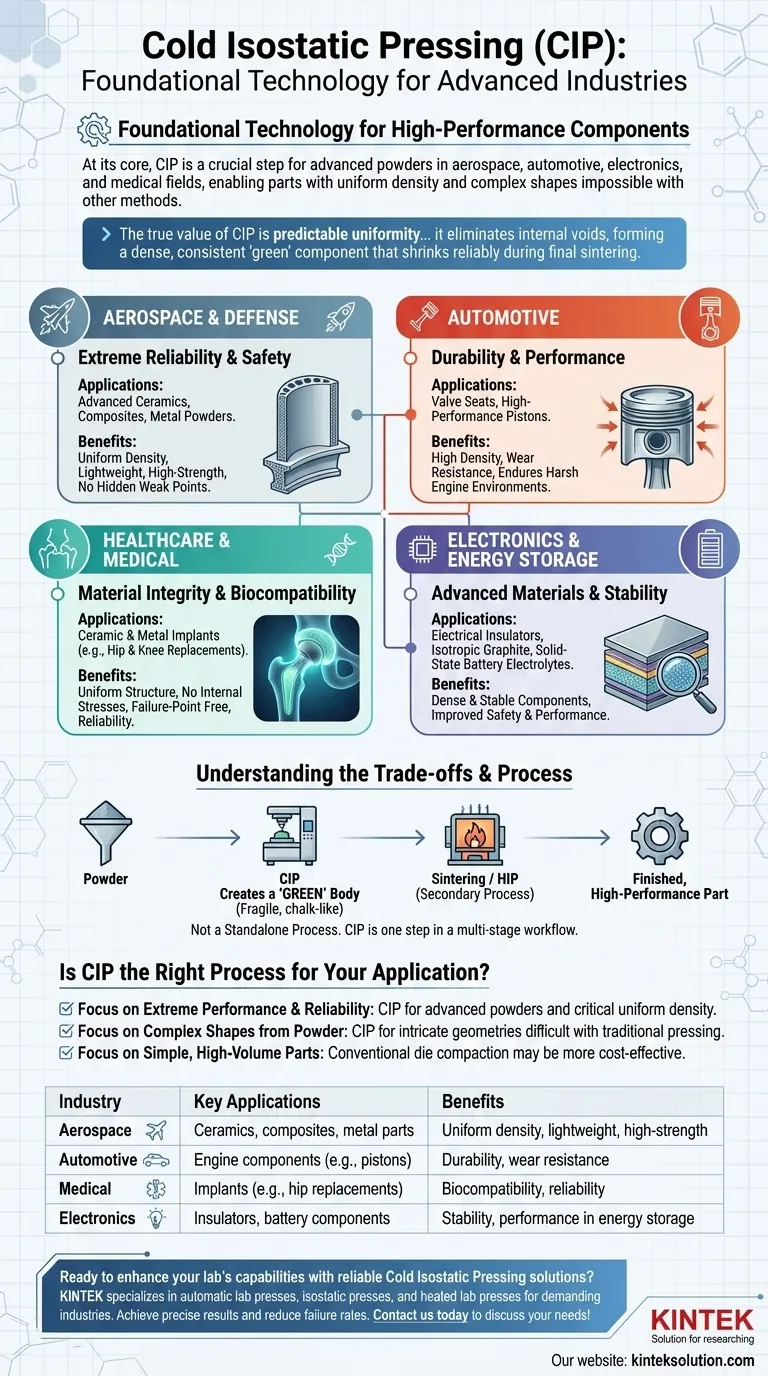
Related Products
- Electric Lab Cold Isostatic Press CIP Machine
- Electric Split Lab Cold Isostatic Pressing CIP Machine
- Automatic Lab Cold Isostatic Pressing CIP Machine
- Lab Isostatic Pressing Molds for Isostatic Molding
- Manual Cold Isostatic Pressing CIP Machine Pellet Press
People Also Ask
- What are the two main techniques used in cold isostatic pressing? Wet-Bag vs. Dry-Bag Methods Explained
- What is the specific function of a Cold Isostatic Press (CIP)? Enhance Carbon Inoculation in Mg-Al Alloys
- What are the advantages of uniform density and structural integrity in CIP? Achieve Superior Performance and Reliability
- What are some examples of applications for cold isostatic pressing? Boost Your Material Performance with Uniform Compaction
- What are the standard specifications for Production Cold Isostatic Press Systems? Optimize Your Material Compaction Process
